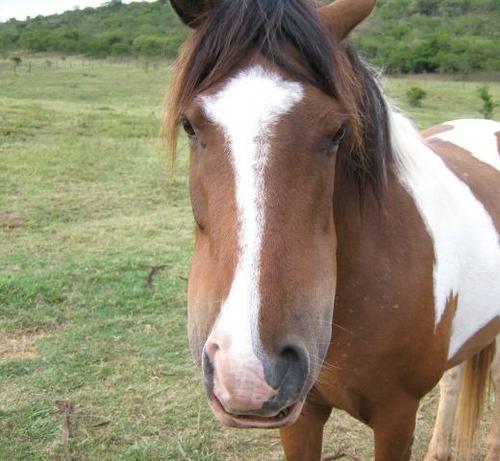Dealing with Snake Bites
As the tempurature starts to get warmer, snakes are starting to come out of their hiding places. In North Carolina, its a good possibility that you may have to deal with a snake encounter at sometime or another. Its a good idea to know what to do if a bite ever occurs.
Over 90% of snake bites occur on the face, primarily on the nose, in pastures or fields while the horse is grazing. Nose bites also occur when the horse gets curious to the sound, sight, and smell of the snake. The second most common bite occurs on the lower limbs. Horses can be bitten on the chest, abdomen, upper legs, or other locations on the body while laying down, but this is a rare occurance. If bitten by a poisonous snake, nose bites are the most serious because of the swelling of the nose and the inability of the horse to efficiently breathe out of its mouth.

Now that you know the target areas, what do you do if your horse is bitten? KEEP CALM. There will be time for you to panic later, but right now you need to focus on keeping yourself and your horse calm. You should keep your horse from moving or becoming excited. Less moving prevents further absorption and circulation of the venom, as well as limiting increasing respiratory rate. If you are at home, lead the horse into a small corral or stall and keep him/her calm while you call for help. If you have to travel a distance for help, get off your horse and slowly lead him/her. For venomous snake bites, immediately call your veterinarian. Treatment is aimed at making sure the horse is able to breathe adequately. While waiting for help to arrive, cut off garden hoses or syringe cases can be placed a distance up the horse's nostrils to open up the airways. As you can imagine, some horses may not tkae to this well. If the horse is bitten on the leg, apply a wide tourniquet proximal to the bite to slow the toxin's spread. Wash the bite area with Betadine and water, but never cut the bite area or try to suction the venom out, especially by mouth.
Sometimes in the heat of the moment, it is hard to identify what kind of snake you are dealing with. It is important to try and identify whether the snake is venomous or not. Not all snakes that bite are poisonous. The general rule of thumb is snakes with elliptical pupils are poisonous and those with round pupils are not. Poisonous snakes have a triangular shaped-head that is generally larger than their body. Non-poisonous snakes taper to a head that is normally the same size as their body. Common snakes of North Carolina can be identified here: http://www.herpsofnc.org/herps_of_NC/snakes/snakes.html

If your animal is susceptible to mud fever, rain scald or thrush, a twice weekly maintenance spray is recommended. If your horse is suffering from minor skin abnormalities caused by greasy heel, rain scald and thrush, place your order for equinecare probiotic spray on our website https://equinecareprobiotic.com.au
ReplyDelete